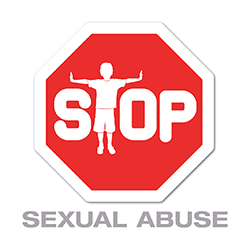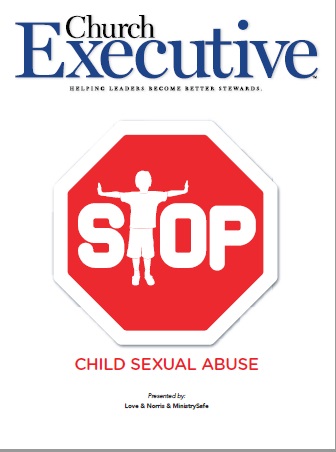
 Protecting the MOST Vulnerable
Protecting the MOST Vulnerable
By Gregory Love & Kimberlee Norris
In ministry programs, we make it a priority to ‘protect the least of these’ — the weak and vulnerable. If a child is viewed as vulnerable, then a special needs child is more vulnerable still.
In fact, a child with a disability may be the most vulnerable individual served by the Church.
Every church has a duty to employ an effective safety system to protect children. If a church serves children with special needs or disabilities, additional training is necessary, and supplemental safety protocols must be employed. When it comes to sexual abuse risk:
• The special needs child may be the highest risk individual served by the church;
• The special needs child may be the least likely to make an outcry; and
• An outcry of abuse from a special needs child, if it occurs, is most easily dismissed.
Every church staff member and volunteer should receive training aimed at prevention of child sexual abuse (Sexual Abuse Awareness Training). This is particularly necessary for those working within a Special Needs Ministry, whether the service provision takes the form of a Sunday School setting, monthly respite care, or seasonal weekend retreats.
NO ONE-SIZE-FITS-ALL ‘SPECIAL NEED’
Though the ministry offering may be referred to as the ‘Special Needs Ministry’, there is no ‘one-size-fits-all’ program, due to the wide variety of disabilities. For example, a special needs child (or adult) may experience an Autism Spectrum Disorder (ASD), Down Syndrome, an orthopedic impairment, speech/hearing/visual/learning challenges, an emotional disturbance, traumatic brain injury or other form of disability.

Given the existence of the disability, it is often difficult for the special needs child to be absorbed into typical Children’s Ministry programs. Instead, it’s often necessary to make one or more accommodations: one-to-one supervision, nursing care, a support animal, or physical accommodations (i.e., grab bars, wheelchair ramps, etc.). Some special needs children need very little assistance, while others require constant one-to-one assistance, given needs related to behavior, sensory stimulation, seizures, toileting, medication or communication.
Many churches with Special Needs Ministries grow organically, making significant program decisions several times a year as a new child comes into the program with a new or unique disability. As a result, ministry leaders are oftentimes required to pivot frequently to accommodate the new child and additional staffing needs. These frequent pivots indicate an organic, rather than intentional style of decision-making.
ORGANIC vs. INTENTIONAL GROWTH
When a church is planted or established, the core ministries take shape, such as preaching, music/worship, children’s and youth ministry. Other ministries tend to follow, such as missions or counseling.
Organic growth
A Special Needs Ministry is typically established because a family in the congregation has a special needs child. The church comes alongside that family and enlists volunteers to support a ministry offering serving the child and family, allowing the parents to enjoy an adult worship experience and a brief period of respite.
Inevitably, word gets out to other families with a special needs child that the church has demonstrated a willingness to serve children with disabilities. Now the church is asked to expand its program to accommodate an entirely new form of disability. Because the church rarely ‘turns people away’, an expectation forms that it is the church’s responsibility to support all who have this type of need. The church becomes pressed to find room within its physical plant and secure sufficient volunteers to meet the growing need to provide adequate care or supervision. The organic nature of the growth and decision-making leads to minimal screening and limited training of volunteers and staff members serving this most vulnerable population.
Many churches with Special Needs Ministries grow organically, making significant program decisions several times a year as a new child comes into the program with a new or unique disability. As a result, ministry leaders are oftentimes required to pivot frequently to accommodate the new child and additional staffing needs. These frequent pivots indicate an organic, rather than intentional style of decision-making.
Intentional growth
If a church intends to provide a Special Needs Ministry, thoughtful decision-making should determine how many special needs children may be served and the types of disabilities to be accommodated. These issues are oftentimes mandated by a limitation of supervisable physical space, particularly given the one-to-one nature of care, and the number of staff members or volunteers available to serve those with disabilities. For example, a church of 500 worshiping in a small building should not try to serve 15 special needs children, because a program of that size requires highly supervised space that can accommodate the 15 special needs children and their ‘buddies’ — a total of at least 30 individuals.
Rather than attempting to provide all things to all people, the church should assume a special needs program will grow and decide — in advance — the number to be served and types of disabilities to be accommodated. A defined intake system should assess the level of support required by each participant and whether a participant presents significant risk to staff members or other participants. The church should act proactively to take steps to ensure that appropriate facilities are available, and staff members and volunteers are well-screened and well-trained.
Modification or adjustment of the church’s physical plant may be driven by the types of disabilities accommodated. Regardless of the disability, adequate staffing and supervision remains critical, and all staff members and volunteers working with special needs individuals must receive training concerning sexual abuse risk unique to children with special needs or disabilities.
SIGNIFICANCE OF STAFFING
When it comes to staffing, a Special Needs Ministry requires that a high emphasis be placed by the Church on (1) accessing an adequate number of those serving; (2) accessing high-quality servers; and (3) screening out the applicant with ill intent.
Adequate staffing
In Children’s Ministry, the Two-Adult Rule has become a standard of care: the policy requirement that every service to children should be supervised by at least two trained, screened adults. In some cases, one adult may be sick or fail to arrive, in which case the ministry may double up classrooms or groups to ‘cover’, thereby maintaining the Two-Adult Rule.
In a Special Needs Ministry, the interaction and supervision are often one-to-one, with very little margin for error when an adult leader fails to arrive. There is often no creative way to address the absence — especially if the staff member or volunteer has unique training or instruction related to a particular participant or disability.
Quality of staffing
Special needs staff members and volunteers must understand and embrace the importance of commitment and dependability. Some forms of disability require specialized caregivers. In most cases, however, special needs children are served by big-hearted volunteers willing to pour their lives into ‘the least of these’. These volunteers are typically well-meaning, but must be trained to understand:
• The general challenges — and enrichment — of serving children with disabilities;
• The specific challenges and unique needs of the child served;
• The risk of sexual abuse within children’s programming — generally; and
• The heightened risk of sexual abuse encountered by children with disabilities.
Where sexual abuse risk is concerned, the special needs child may be the most vulnerable sheep in the sheep pen. All ministry leaders, staff members and volunteers associated with a Special Needs Ministry must understand how the sexual abuser operates, why special needs children are particularly vulnerable, and the grooming process of the abuser. The Church must commit to the expenditure of significant ministry resources to effectively screen those who express interest in serving in this realm. Learn more about Skillful Screening Training, equipping ministry managers and screening personnel to recognize high-risk indicators related to child sexual abuse at www.MinistrySafe.com/training-sst.
IMPORTANCE OF TRAINING
Every individual wearing a church’s nametag should complete Sexual Abuse Awareness Training, which addresses: Facts vs. Misconceptions, Abuser Characteristics, the Abuser’s Grooming Process, Common Grooming Behaviors, Peer-to-Peer Sexual Abuse, the Impact of Abuse and the Importance of Reporting. This training is imperative for those serving children or youth. Working with special needs children requires additional training addressing the unique — and heightened — risk of sexual abuse for special needs children.
Sexual abuse risk — generally
In the United States, conservative studies report that 60 million Americans were sexually abused before reaching age 18 — regardless of disability. Given a population of 300 million, that means that 1 out of 5 Americans was sexually abused before reaching adulthood. More specifically, studies indicate that 1 in 4 girls and 1 in 6 boys will be sexually abused before reaching age 18. Clearly, the problem is staggering.
Sexual abuse risk — special needs
Though not all forms of disability carry the same level of risk, statistics related to those with disabilities indicate higher risk across the board. The data clearly indicates that those with disabilities are more likely to experience sexual abuse than those without — in fact, far more likely. One study reports that individuals with disabilities are sexually assaulted at nearly three times the rate of those without disabilities, while the U.S. Department of Justice suggests the number may be as much as seven times higher. Though the studies vary, all show a disproportionately higher rate of sexual abuse experienced by individuals with disabilities.
Unfortunately, more than 95% of sexual abuse involving an individual with a disability goes unreported to appropriate authorities, leaving a mere 5% that is reported. Why? This is partially explained by the dynamics of the circumstances of the disabled child and those providing care — addressed below. Sadly, children with disabilities are often targeted BECAUSE of their disabilities, and are not believed DUE to their disabilities.
Children with disabilities — why higher-risk?
Why is sexual abuse risk higher for children with a disability?
The Grooming Process
When sexual abuse occurs, the abuser often selects a child who may be manipulated into trusted time alone, then deceived into inappropriate forms of touch. Manipulation and deception are hallmarks of the grooming process utilized by the abuser to gain access to children within an age and gender of preference, select a specific child, introduce nudity and sexual touch, then keep the victim silent.
An understanding of the abuser’s grooming process is critical in the evaluation of sexual abuse risk and prevention.
Grooming the Gatekeepers
Almost without exception, child sexual abuse victims are groomed for sexual interaction, and the gatekeepers — adults who care for the targeted child — are groomed as well. Why groom the gatekeepers? The perpetrator is looking for trusted time alone with the targeted child, so the abuser works to convince gatekeepers that he or she is helpful, trustworthy and respectable.
Grooming the Child
Once the abuser identifies the targeted child, the abuser engages in barrier testing and erosion — through forms of touch, banter, horseplay, playful activities and physical interaction. The abuser manipulates the targeted child into places or circumstances of isolation, where the barriers of appropriate touch or behavior are challenged and pushed. At this point, the abuser introduces forms of nudity and inappropriate touch, all the while communicating that the behavior or interaction must remain secret.
These forms of touch and banter are intended to desensitize the child to touch and move appropriate boundaries, always characterized by manipulation and deception.
Grooming & special needs children
The child with a disability is at higher risk for abuse because the disability often makes the child more susceptible to manipulation and deception — particularly when the abuser is ‘known’ to the child. As children age and develop, they gain a sense of independence and self-sufficiency — which means fewer individuals are engaged with the child in behaviors that may call for intimate touch, such as bathing, toileting or other forms of hygiene. Depending on the type or severity of a disability, the special needs child may require ongoing forms of assistance involving touch. The barriers to touch do not exist or develop in the same manner, resulting in far greater opportunity for manipulation and deception, leading to inappropriate sexual touch.
This is compounded by the fact that a child with a disability is less likely to make an outcry or be believed — given that the abuser has groomed the gatekeepers — convincing other adults and caregivers that the abuser may be touchy and playful but presents no risk of sexually inappropriate behavior.
Additionally, the child with a disability is often dependent — and that dependency forces the child to trust others — starting at an early age. The special needs child trusts others to engage in appropriate touch and assumes that all touch from a caregiver is proper. An individual with ill intent can easily take advantage of that assumption.
When a disability is more severe, the child may receive care from an organization or agency and may be touched in an intimate manner as a routine element of care and personal hygiene, often provided by care providers the child has never met or does not remember. Again, an abuser can easily take advantage of this circumstance.
It can be challenging for a child with a disability to understand that there are those who should and should not touch them — or should not touch them in a certain manner or area of the body. This confusion may be compounded by the fact that children with disabilities are often encouraged or expected to follow the direction of those without disabilities: family members and caregivers.
By its very nature, the disability may foster an atmosphere ripe
for exploitation.
TRAINING RESOURCES AVAILABLE
Ministries must be equipped with good instruction for all child-serving programs; this is particularly true when serving children or adults with disabilities.
MinistrySafe training
In addition to industry-leading training resources, MinistrySafe offers specialty supplements related to Children’s Ministry, Youth Ministry, Camp Programming, Day Care, Education and Youth Sport; and now a specialty training supplement for Special Needs.
Sexual Abuse Awareness Training includes these topics:
• Facts vs. Misconceptions
• Abuser Characteristics
• The Abuser’s Grooming Process
• Common Grooming Behaviors
• Peer-to-Peer Sexual Abuse
• Impact of Abuse on a Child
• Reporting Requirements
The Special Needs supplement adds additional content:
• The Heightened Risk of Sexual Abuse
• The Abuser’s Grooming Process in Special Needs Contexts
• Signs of Sexual Abuse
• Challenges to Communicating an Outcry
• Overcoming Barriers to Reporting
Joni & Friends
Whether a church is initiating a Special Needs Ministry or has a program underway, good instruction is critical. MinistrySafe resources address sexual abuse awareness and prevention; Joni & Friends provides a wide variety of educational and training resources for churches providing ministry opportunities for children and adults with disabilities. Learn more about Joni & Friends at JoniandFriends.org and the comprehensive resources and training available at Courses.JoniandFriends.org.
SUMMARY
Special Needs Ministries offer tremendous opportunity to enrich the lives of children, while providing respite for a stretched-thin parent. Those who serve special needs children report a fulfillment that far surpasses the investment of time and resources expended.
At the same time, Special Needs Ministries must take intentional steps to ensure that all participants are safe and well-supervised, rather than offering an ‘easy in’ for applicants with the wrong motive.
Churches committed to serving these families must be intentional when establishing and growing a Special Needs Ministry: Staffing the program, Screening applicants, Training staff members and volunteers, and creating Policies & Procedures consistent with effective training.
When the Church does so with excellence, special needs children and their families are well-served.
Kimberlee Norris and Gregory Love are partners in the Fort Worth, Texas law firm of Love & Norris [ www.LoveNorris.com ] and founders of MinistrySafe
[ www.MinistrySafe.com ], providing child sexual abuse expertise to ministries worldwide. After representing victims of child sexual abuse for more than two decades, Love and Norris saw recurring, predictable patterns in predatory behavior. MinistrySafe grew out of their desire to place proactive tools into the hands of ministry professionals.
Love and Norris teach the only graduate-level course on ‘Preventing Sexual Abuse in Ministry Contexts’ as Visiting Faculty at Dallas Theological Seminary.


